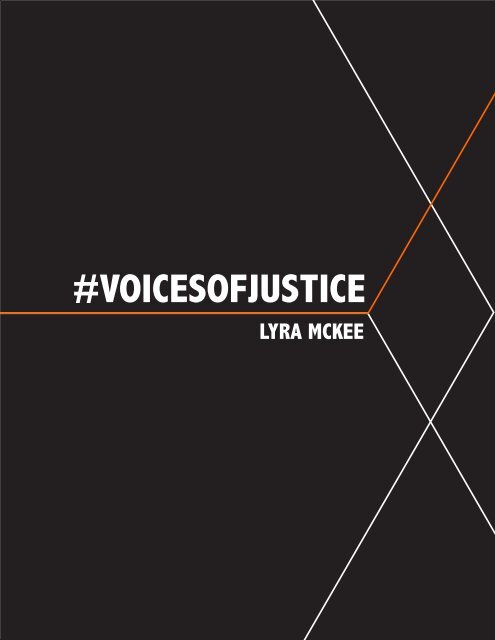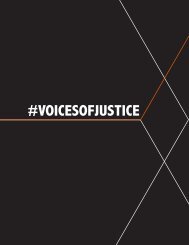Lyra McKee – The Justice Hack – Voices of Justice Magazine 2021
A conversation with Lyra McKee, Co-Executive Director of PACE Society, for Voices of Justice, a project that discusses access to justice in British Columbia.
A conversation with Lyra McKee, Co-Executive Director of PACE Society, for Voices of Justice, a project that discusses access to justice in British Columbia.
Create successful ePaper yourself
Turn your PDF publications into a flip-book with our unique Google optimized e-Paper software.
#VOICESOFJUSTICE<br />
LYRA MCKEE<br />
#VOICESOFJUSTICE
PACE SOCIETY’S LYRA MCKEE<br />
PAGE 22
WE BELIEVE<br />
THAT LIVED<br />
EXPERIENCE IN<br />
THE COMMUNITIES<br />
THAT WE’RE<br />
SERVING IS<br />
INVALUABLE TO<br />
PROVIDING THE<br />
BEST SERVICES<br />
POSSIBLE FOR<br />
OUR MEMBERS<br />
<strong>Lyra</strong> <strong>McKee</strong> is Co-Executive<br />
Director <strong>of</strong> PACE Society.<br />
Can you tell us about PACE<br />
Society?<br />
PACE stands for Providing<br />
Advocacy, Counselling and<br />
Education. We are a for, by and<br />
with sex workers organization<br />
that was founded in 1994. We’ve<br />
always been open to sex workers<br />
<strong>of</strong> all genders, and we take a<br />
very broad definition <strong>of</strong> what sex<br />
work is. That includes escorting,<br />
camwork, stripping, sensual<br />
services, pretty much anything<br />
the term can commonly be used<br />
to define. We provide support<br />
services to sex workers primarily<br />
in the Downtown Eastside, but<br />
also Greater Vancouver.<br />
#VOICESOFJUSTICE
Why do you believe the by and for sex<br />
workers model is advantageous?<br />
We prioritize hiring sex workers and<br />
community members with lived experience<br />
in a variety <strong>of</strong> categories such as BIPOC<br />
sex workers or community members, and<br />
trans, non-binary and two-spirit community<br />
members, because we believe that lived<br />
experience in the communities that we’re<br />
serving is invaluable to providing the best<br />
services possible for our members. We use<br />
the word members to be more inclusive than<br />
clients. All <strong>of</strong> our services are delivered better<br />
when peers are involved in the creation and<br />
delivery <strong>of</strong> those services.<br />
How might the individuals you serve face<br />
barriers to access to justice?<br />
Up until 2013, sex work was criminalized<br />
more directly, and then once Bedford<br />
happened, the Supreme Court case turned<br />
over those sex work laws and the Harper<br />
government instituted the Protection <strong>of</strong><br />
Communities and Exploited Persons Act. Sex<br />
work is now asymmetrically criminalized,<br />
meaning sex work itself is not criminalized,<br />
but many aspects <strong>of</strong> the work are, such as<br />
purchasing sex. Clients, advertising and<br />
third parties procuring are all criminalized.<br />
<strong>The</strong>re’s a criminalization aspect that prevents<br />
sex workers from organizing together, from<br />
protecting each other, from accessing full<br />
labour rights and unionizing. And then<br />
there’s also stigma in society on sex work and<br />
sex workers that impacts access to justice<br />
and compounds with other types <strong>of</strong> stigma<br />
and marginalization, such as racism and<br />
transphobia and entrenched poverty.<br />
A variety <strong>of</strong> compounding barriers <strong>–</strong> including<br />
criminalization, stigma, lack <strong>of</strong> access to the<br />
financial means to get legal representation,<br />
and lack <strong>of</strong> access to information or resources<br />
<strong>–</strong> prevent access to full labour and human<br />
rights for many sex workers.<br />
Can you elaborate on some <strong>of</strong> the specific<br />
challenges involved in accessing legal<br />
representation?<br />
I think it really depends on who you’re talking<br />
about. Not all sex workers face economic<br />
marginalization. Some sex workers have<br />
other jobs, or some sex workers earn quite a<br />
bit <strong>of</strong> income from sex work, but a lot <strong>of</strong> sex<br />
workers, especially street-based sex workers,<br />
<strong>of</strong>ten face a high level <strong>of</strong> isolation and<br />
marginalization, as well as a lack <strong>of</strong> steady or<br />
sufficient income to access legal services.<br />
Because <strong>of</strong> criminalization and stigma, sex<br />
workers may have a lack <strong>of</strong> information about<br />
their legal situation and the details <strong>of</strong> the<br />
sex work laws that are used against them.<br />
<strong>The</strong>re’s an element <strong>of</strong> secrecy or isolation<br />
that’s involved with the work. I would say<br />
that it’s also a barrier that resources just<br />
aren’t always readily available. Some streetbased<br />
sex workers don’t even have access to<br />
the internet, or the space and time to do the<br />
research to find the right lawyer or find the<br />
services they need.<br />
What is PACE’s Gender Self-Determination<br />
Project?<br />
<strong>The</strong> Gender Self-Determination Project is<br />
open to anyone who approaches us and wants<br />
to get their name, legal name, or legal gender<br />
A VARIETY OF COMPOUNDING BARRIERS <strong>–</strong> INCLUDING CRIM<br />
MEANS TO GET LEGAL REPRESENTATION, AND LACK OF ACCE<br />
FULL LABOUR AND HUMAN RIG<br />
PAGE 24
markers changed in British Columbia. We<br />
provide the fees associated with name<br />
changes, and support on filling out all the<br />
different forms and letting people know<br />
where to send them. It’s a really exciting<br />
project, and it definitely works to mitigate<br />
some <strong>of</strong> those barriers that some sex workers<br />
face, or community and trans community<br />
members face, to getting name changes, and<br />
gender marker changes.<br />
It may seem small, but if you’re getting a job<br />
somewhere, all <strong>of</strong> the documents that your<br />
employer sees have your legal name and<br />
gender marker on them. It’s a matter <strong>of</strong> not<br />
just safety, but also comfort for people in<br />
terms <strong>of</strong> employment, in terms <strong>of</strong> accessing<br />
social services. <strong>The</strong>se days, these little<br />
things that most people take for granted are<br />
really, really vital and inform every aspect <strong>of</strong><br />
people’s lives.<br />
Could you address what Canada v.<br />
Downtown Eastside Sex Workers United<br />
Against Violence and Bedford v. Canada<br />
were about and any ongoing advocacy or<br />
research related to them?<br />
PACE was able to intervene with a number<br />
<strong>of</strong> other organizations, along with Sheri<br />
Kiselbach <strong>–</strong> who used to work at PACE <strong>–</strong> in<br />
Bedford V. Canada, which was challenging<br />
the previous sex work laws that prohibited<br />
solicitation and bawdy-houses and all these<br />
different prescriptions against sex work.<br />
Sheri was able to get standing to file<br />
a challenge to the sex work laws as a<br />
former sex worker, and then she joined<br />
the Bedford case because it was already<br />
going on in the Supreme Court. Those laws<br />
were struck down, which was definitely a<br />
victory. Unfortunately, it was a conservative<br />
government that then instituted some new<br />
laws that, it could be argued, were just as<br />
harmful as the previous ones.<br />
We continually look for advocacy possibilities<br />
at the municipal, provincial and federal<br />
levels, both toward the government and<br />
to health authorities and various different<br />
organizations and entities. We’re part <strong>of</strong><br />
several research projects ongoing and<br />
looking at new ones as well, and continually<br />
look for different ways to advocate for<br />
decriminalization <strong>of</strong> sex work. <strong>The</strong>re are<br />
some new developments coming up that I<br />
can’t really talk about yet, but exciting things<br />
are happening in the law reform advocacy<br />
area. It just kind <strong>of</strong> never ends for us.<br />
Can you elaborate on how those new laws<br />
could arguably be just as harmful?<br />
Even though, technically, sex work is not<br />
criminalized, pretty much every aspect <strong>of</strong><br />
work is criminalized. So it prevents sex<br />
workers from ensuring each other’s safety, it<br />
prevents sex workers from screening clients<br />
appropriately before taking dates, it prevents<br />
sex workers from having rights for the refusal<br />
<strong>of</strong> dates that seem risky. <strong>The</strong>y can’t file taxes<br />
for fear <strong>of</strong> the government wanting to know<br />
who their clients are or where their money<br />
comes from. It’s very complicated, but I<br />
would say that, because so many different<br />
aspects integral to how the work progresses<br />
are criminalized, usually, it’s really just as<br />
bad as it was when prostitution itself was<br />
criminalized.<br />
INALIZATION, STIGMA, LACK OF ACCESS TO THE FINANCIAL<br />
SS TO INFORMATION OR RESOURCES <strong>–</strong> PREVENT ACCESS TO<br />
HTS FOR MANY SEX WORKERS<br />
#VOICESOFJUSTICE



